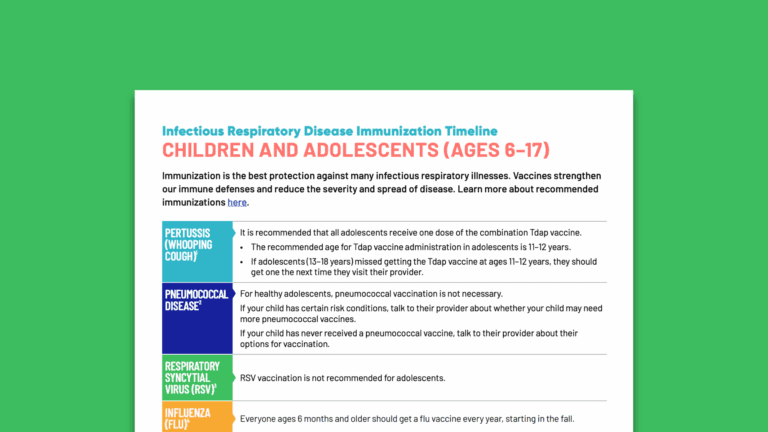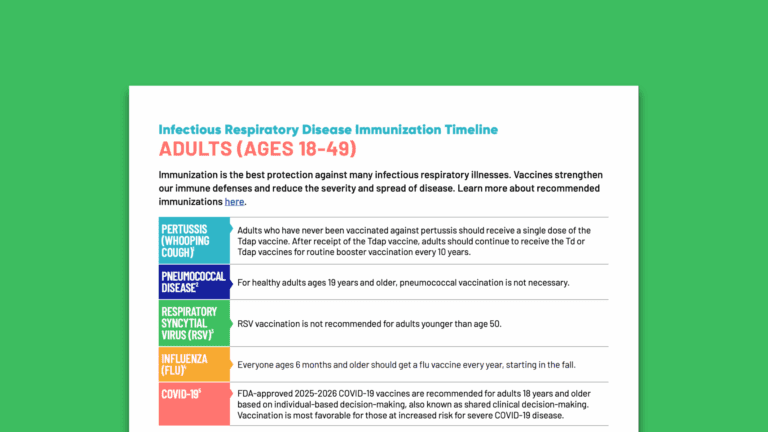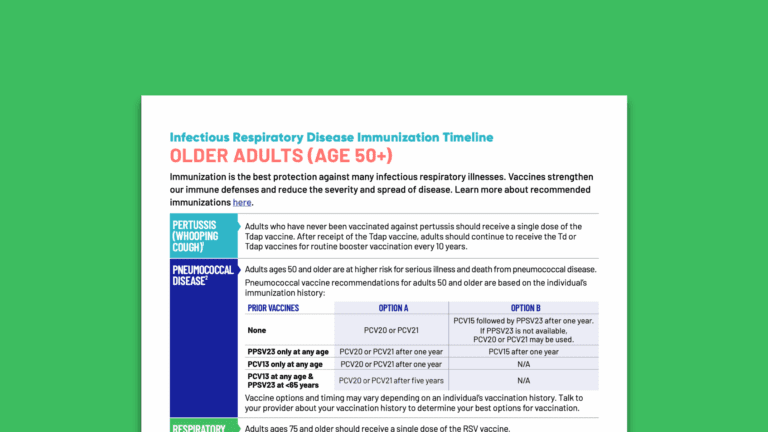COVID-19
Need vaccine information?
Check out the resources below.
COVID-19 remains a significant threat, with thousands of hospitalizations and hundreds of deaths occurring weekly in the U.S.
Despite the success of vaccines, some people have risk factors that put them at high risk for severe illness from COVID-19.
Who needs to be protected?
FDA-approved 2025-2026 COVID-19 vaccines are recommended by the Centers for Disease Control and Prevention’s (CDC’s) Advisory Committee on Immunization Practices (ACIP) for those:
- 6 months to 64 years of age based on individual decision-making, also known as shared clinical decision-making.* Vaccination is most favorable for those at increased risk for severe COVID-19 disease.
- 65+ based on individual decision-making.
This recommendation does not require a prescription to receive a 2025-2026 COVID-19 vaccine, though encourages people to talk to a health care provider (e.g., doctor, nurse, pharmacist) to help them assess if the vaccine is right for them. COVID-19 vaccines should be available at your local pharmacy but call ahead to ensure availability.
COVID-19 vaccines are covered by both public (Medicaid and Medicare) and private insurance, including employer-sponsored insurance, without cost-sharing.
*In conversation with a healthcare provider, the decision to vaccinate is made based on individual characteristics, including risk factors, characteristics of the vaccine itself, and evidence of who may benefit from vaccination.
What vaccine options are available?
Three COVID-19 vaccines are available in the U.S., including two mRNA vaccine options (Moderna and Pfizer) and one protein-based vaccine option (Novavax).
Many pharmacies offer a range of vaccines. Visit vaccines.gov to find a pharmacy near you.
I’m feeling lousy. How do I figure out what I have?
Visit CDC’s website to learn more about symptoms for COVID-19, influenza (flu), whooping cough, pneumococcal disease, and respiratory syncytial virus (RSV).
Symptoms of COVID-19 may include:
- Fever* or chills
- Cough
- Shortness of breath or difficulty breathing
- Fatigue
- Muscle or body aches
- Headache
- New loss of taste or smell
- Sore throat
- Congestion or runny nose
- Nausea or vomiting
- Diarrhea
*There is some research that indicates that fever in older adults may be lower than the typical 101.4 F.
If you have COVID-19 symptoms, it’s important to get tested. At-home testing options are available, and many healthcare providers offer testing in their practices.
What should I do if I or a loved one has COVID-19?
It is important to follow CDC guidance to help protect yourself from severe illness and to prevent spreading the disease to others.
Some individuals may be at higher risk of getting severe illness from COVID-19. If this applies to you or your loved one, talk to a healthcare provider as soon as possible to determine if an antiviral treatment option approved by the Food and Drug Administration (FDA) is right for you. COVID-19 oral antivirals are most effective at preventing severe illness when they are started as soon as possible after being infected — within 5 days after symptoms begin.
Latest Resources

CDC Guidance | Childhood | COVID-19 | Flu | Pertussis (Whooping Cough) | Pneumococcal Disease | RSV | Vaccines
Infectious Respiratory Disease Immunization Timeline: Children and Adolescents (Ages 6-17)
Read moreThe Risks Are Real
The risks of infectious respiratory disease are real and vaccines are a critical tool that help protect against severe outcomes — particularly for children, pregnant people, older adults and those with underlying medical conditions.
Hear from health care providers on their stories and perspectives around the real impact of illness and the importance of prevention.
Hear from health care providers on their stories and perspectives around the real impact of illness and the importance of prevention.

